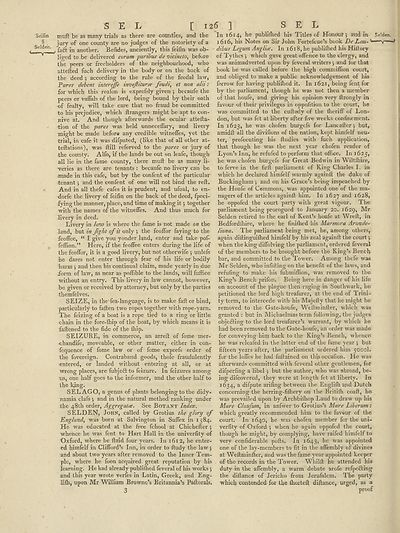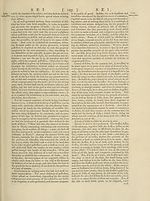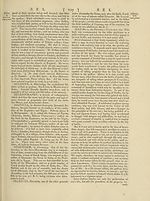Encyclopaedia Britannica, or, a Dictionary of arts, sciences, and miscellaneous literature : enlarged and improved. Illustrated with nearly six hundred engravings > Volume 19, Scripture-SUG
(136) Page 126
Download files
Complete book:
Individual page:
Thumbnail gallery: Grid view | List view

S E L [ 126 ] S E L
Seifm tnuft be as many trials as there are counties, and the
H jury of one county are no judges of the notoriety of a
Se en' . fa£t in another. Befides, anciently, this feifm was ob¬
liged to be delivered coram paribus de vicmeto, before
the peers or freeholders of the neighbourhood, who
attefted fuch delivery in the body or on the back of
the deed ; according to the rule of the feodal law,
Pares debcnt interej/e invejliturce feudi, et non alii:
for which this reafon is exprefsly given •, becaufe the
peers or vaffals of the lord, being bound by their oath
of fealty, will take care that no fraud be committed
to his prejudice, which ftrangers might be apt to con¬
nive at. And though afterwards the ocular attefta-
tion of the pares was held unneceffary, and livery
might be made before any credible witneffes, yet the
trial, in cafe it was difputed, (like that of all other at-
teftations), was Hill referved to the pares or jury of
the county. Alfo, if the lands be out on leafe, though
all lie in the fame county, there muft be as many li¬
veries as there are tenants : becaufe no livery can be
made in this cafe, but by the confent of the particular
tenant j and the confent of one will not bind the reft.
And in all thefe cafes it is prudent, and ufual, to en-
dorfe the livery of feifin on the back of the deed, fpeci-
fying the manner, place, and time of making it; together
with the names of the witneffes. And thus much for
livery in deed.
Livery in law is where the fame is not made on the
land, but in Jight of it only 5 the feoffor faying to the
feoffee, “ I give you yonder land, enter and take pof-
reflion,” Here, if the feoffee enters during the life of
the feoffor, it is a good livery, but not otherwife *, unlefs
he dares not enter through fear of his life or bodily
harm $ and then his continual claim, made yearly in due
form of law, as near as poflible to the lands, will fuffice
without an entry. This livery in law cannot, however,
be given or received by attorney, but only by the parties
themfelves.
SEIZE, in the fea-language, is to make faft or bind,
particularly to fatten two ropes together with rope-yarn.
The feizing of a boat is a rope tied to a ring or little
chain in the fore-lhip of the boat, by which means it is
faftened to the fide of the (hip.
SEIZURE, in commerce, an arreft of fome mer-
chandife, moveable, or other matter, either in con-
fequence of fome law or of fome exprefs order of
the fovereign. Contraband goods, thofe fraudulently
entered, or landed without entering at all, or at
wrong places, are fubjeft to feizure. In feizures among
\is, one half goes to the informer, and the other half to
the king.
SELAGO, a genus of plants belonging to the didy-
namia clafs and in the natural method ranking under
the 48th order, Aggregates. See Botany Index.
SELDEN, John, called by Grotius the glory of
England, was born at Salvington in Suffex in 1584.
He was educated at the free fchool at Chichefter ;
whence he was fent to Hart Hall in the univerfity of
Oxford, where he ftaid four years. In 1612, he enter¬
ed himfelf in Clifford’s Inn, in order to ftudy the law 5
and about two years after removed to the Inner Tem¬
ple, where he foon acquired great reputation by his
learning. He had already publilhed feveral of his -works }
and this year wrote verfes in Latin, Greek, and Eng-
lifti, upon Mr William Browne’s Britannia’s Paftorals.
3
In 1614, he publithed his Titles of Honour; and in SeMen.
1616, his Notes on Sir John Fortefcue’s book De Lau-{—~rmm"
dibus Legum Anglice. In 1618, he publiftied his Hittory
of Tythes ; which gave great offence to the clergy, and
was animadverted upon by feveral writers; and for that
book he was called before the high commiflion court,
and obliged to make a public acknowledgement of his
forrow for having publiftied it. In 1621, being fent for
by the parliament, though he was not then a member
of that houfe, and giving his opinion very ftrongly in
favour of their privileges in oppofttion to the court, he
was committed to the cuftody of the fheriff of Lon¬
don, but was fet at liberty after five weeks confinement.
In 1623, he was chofen burgefs for Lancafter ; but,
amidft all the divifions of the nation, kept himfelf neu¬
ter, profecuting his ftudies with fuch application,
that though he was the next year chofen reader of
Lyon’s Inn, he refufed to perform that office. In 1625,
he was chofen burgefs for Great Bedwin in Wiltfhire,
to ferve in the firft parliament of King Charles I. in
which he declared himfelf warmly againft the duke of
Buckingham ; and on his Grace’s being impeached by
the Houfe of Commons, was appointed one of the ma¬
nagers of the articles againft him. In 1627 an<^ *628,
he oppofed the court party with great vigour. The
parliament being prorogued to January 20. 1629, Mr
Selden retired to the earl of Kent’s houfe at Wreft, in
Bedfordffiire, where he finifhed his Marmora Arunde-
liana. The parliament being met, he, among others,
again diftinguifhed himfelf by his zeal againft the court ;
when the king diffolving the parliament, ordered feveral
of the members to be brought before the King’s Bench
bar, and committed to the Tower. Among thefe was
Mr Selden, who infilling on the benefit of the laws, and
refufing to make his fubmiffion, was removed to the
King’s Bench prifon. Being here in danger of his life
on account of the plague then raging in Southwark, he
petitioned the lord high treafurer, at the end of Trini¬
ty term, to intercede with his Majefty that he might be
removed to the Gate-houfe, Weftminfter, which was
granted : but in Michaelmas term following, the judges
objedling to the lord treafurer’s warrant, by which he
had been removed to the Gate-houfe, an order was made
for conveying him back to the King’s Bench, whence
he was releafed in the latter end of the fame year ; but
fifteen years after, the parliament ordered him 5000I.
for the Ioffes he had fuftained on thisoccafion. He wras
afterwards committed with feveral other gentlemen, for
difperfing a libel ; but the author, who was abroad, be¬
ing difeovered, they were at length fet at liberty. In
1634, a difpute arifing between the Englilh and Dutch
concerning the herring-fifhery on the Britifh coaft, he
was prevailed upon by Archbilhop Laud to draw up his
Mare Claufum, in anfwer to Grotius’s Mare Liberum:
which greatly recommended him to the favour of the
court. In 1640, he w'as chofen member for the uni¬
verfity of Oxford ; when he again oppofed the court,
though he might, by complying, have raifed himfelf to
very confiderable polls. In 1643, ^ie was appointed
one of the lay-members to fit in the affembly of divines
at Weftminfter, and was the fame year appointed keeper
of the records in the Tower. Whilft he attended his
duty in the affembly, a warm debate arofe refpedling
the diftance of Jericho from Jerufalem. The party
which contended for the fhorteft diftance, urged, as a
Seifm tnuft be as many trials as there are counties, and the
H jury of one county are no judges of the notoriety of a
Se en' . fa£t in another. Befides, anciently, this feifm was ob¬
liged to be delivered coram paribus de vicmeto, before
the peers or freeholders of the neighbourhood, who
attefted fuch delivery in the body or on the back of
the deed ; according to the rule of the feodal law,
Pares debcnt interej/e invejliturce feudi, et non alii:
for which this reafon is exprefsly given •, becaufe the
peers or vaffals of the lord, being bound by their oath
of fealty, will take care that no fraud be committed
to his prejudice, which ftrangers might be apt to con¬
nive at. And though afterwards the ocular attefta-
tion of the pares was held unneceffary, and livery
might be made before any credible witneffes, yet the
trial, in cafe it was difputed, (like that of all other at-
teftations), was Hill referved to the pares or jury of
the county. Alfo, if the lands be out on leafe, though
all lie in the fame county, there muft be as many li¬
veries as there are tenants : becaufe no livery can be
made in this cafe, but by the confent of the particular
tenant j and the confent of one will not bind the reft.
And in all thefe cafes it is prudent, and ufual, to en-
dorfe the livery of feifin on the back of the deed, fpeci-
fying the manner, place, and time of making it; together
with the names of the witneffes. And thus much for
livery in deed.
Livery in law is where the fame is not made on the
land, but in Jight of it only 5 the feoffor faying to the
feoffee, “ I give you yonder land, enter and take pof-
reflion,” Here, if the feoffee enters during the life of
the feoffor, it is a good livery, but not otherwife *, unlefs
he dares not enter through fear of his life or bodily
harm $ and then his continual claim, made yearly in due
form of law, as near as poflible to the lands, will fuffice
without an entry. This livery in law cannot, however,
be given or received by attorney, but only by the parties
themfelves.
SEIZE, in the fea-language, is to make faft or bind,
particularly to fatten two ropes together with rope-yarn.
The feizing of a boat is a rope tied to a ring or little
chain in the fore-lhip of the boat, by which means it is
faftened to the fide of the (hip.
SEIZURE, in commerce, an arreft of fome mer-
chandife, moveable, or other matter, either in con-
fequence of fome law or of fome exprefs order of
the fovereign. Contraband goods, thofe fraudulently
entered, or landed without entering at all, or at
wrong places, are fubjeft to feizure. In feizures among
\is, one half goes to the informer, and the other half to
the king.
SELAGO, a genus of plants belonging to the didy-
namia clafs and in the natural method ranking under
the 48th order, Aggregates. See Botany Index.
SELDEN, John, called by Grotius the glory of
England, was born at Salvington in Suffex in 1584.
He was educated at the free fchool at Chichefter ;
whence he was fent to Hart Hall in the univerfity of
Oxford, where he ftaid four years. In 1612, he enter¬
ed himfelf in Clifford’s Inn, in order to ftudy the law 5
and about two years after removed to the Inner Tem¬
ple, where he foon acquired great reputation by his
learning. He had already publilhed feveral of his -works }
and this year wrote verfes in Latin, Greek, and Eng-
lifti, upon Mr William Browne’s Britannia’s Paftorals.
3
In 1614, he publithed his Titles of Honour; and in SeMen.
1616, his Notes on Sir John Fortefcue’s book De Lau-{—~rmm"
dibus Legum Anglice. In 1618, he publiftied his Hittory
of Tythes ; which gave great offence to the clergy, and
was animadverted upon by feveral writers; and for that
book he was called before the high commiflion court,
and obliged to make a public acknowledgement of his
forrow for having publiftied it. In 1621, being fent for
by the parliament, though he was not then a member
of that houfe, and giving his opinion very ftrongly in
favour of their privileges in oppofttion to the court, he
was committed to the cuftody of the fheriff of Lon¬
don, but was fet at liberty after five weeks confinement.
In 1623, he was chofen burgefs for Lancafter ; but,
amidft all the divifions of the nation, kept himfelf neu¬
ter, profecuting his ftudies with fuch application,
that though he was the next year chofen reader of
Lyon’s Inn, he refufed to perform that office. In 1625,
he was chofen burgefs for Great Bedwin in Wiltfhire,
to ferve in the firft parliament of King Charles I. in
which he declared himfelf warmly againft the duke of
Buckingham ; and on his Grace’s being impeached by
the Houfe of Commons, was appointed one of the ma¬
nagers of the articles againft him. In 1627 an<^ *628,
he oppofed the court party with great vigour. The
parliament being prorogued to January 20. 1629, Mr
Selden retired to the earl of Kent’s houfe at Wreft, in
Bedfordffiire, where he finifhed his Marmora Arunde-
liana. The parliament being met, he, among others,
again diftinguifhed himfelf by his zeal againft the court ;
when the king diffolving the parliament, ordered feveral
of the members to be brought before the King’s Bench
bar, and committed to the Tower. Among thefe was
Mr Selden, who infilling on the benefit of the laws, and
refufing to make his fubmiffion, was removed to the
King’s Bench prifon. Being here in danger of his life
on account of the plague then raging in Southwark, he
petitioned the lord high treafurer, at the end of Trini¬
ty term, to intercede with his Majefty that he might be
removed to the Gate-houfe, Weftminfter, which was
granted : but in Michaelmas term following, the judges
objedling to the lord treafurer’s warrant, by which he
had been removed to the Gate-houfe, an order was made
for conveying him back to the King’s Bench, whence
he was releafed in the latter end of the fame year ; but
fifteen years after, the parliament ordered him 5000I.
for the Ioffes he had fuftained on thisoccafion. He wras
afterwards committed with feveral other gentlemen, for
difperfing a libel ; but the author, who was abroad, be¬
ing difeovered, they were at length fet at liberty. In
1634, a difpute arifing between the Englilh and Dutch
concerning the herring-fifhery on the Britifh coaft, he
was prevailed upon by Archbilhop Laud to draw up his
Mare Claufum, in anfwer to Grotius’s Mare Liberum:
which greatly recommended him to the favour of the
court. In 1640, he w'as chofen member for the uni¬
verfity of Oxford ; when he again oppofed the court,
though he might, by complying, have raifed himfelf to
very confiderable polls. In 1643, ^ie was appointed
one of the lay-members to fit in the affembly of divines
at Weftminfter, and was the fame year appointed keeper
of the records in the Tower. Whilft he attended his
duty in the affembly, a warm debate arofe refpedling
the diftance of Jericho from Jerufalem. The party
which contended for the fhorteft diftance, urged, as a
Set display mode to:
![]() Universal Viewer |
Universal Viewer | ![]() Mirador |
Large image | Transcription
Mirador |
Large image | Transcription
Images and transcriptions on this page, including medium image downloads, may be used under the Creative Commons Attribution 4.0 International Licence unless otherwise stated. ![]()
| Permanent URL | https://digital.nls.uk/192697050 |
|---|
| Attribution and copyright: |
|
|---|
| Description | Ten editions of 'Encyclopaedia Britannica', issued from 1768-1903, in 231 volumes. Originally issued in 100 weekly parts (3 volumes) between 1768 and 1771 by publishers: Colin Macfarquhar and Andrew Bell (Edinburgh); editor: William Smellie: engraver: Andrew Bell. Expanded editions in the 19th century featured more volumes and contributions from leading experts in their fields. Managed and published in Edinburgh up to the 9th edition (25 volumes, from 1875-1889); the 10th edition (1902-1903) re-issued the 9th edition, with 11 supplementary volumes. |
|---|---|
| Additional NLS resources: |
|

